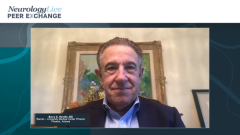
Treating Smoldering Inflammation in MS
Drs Barry A. Hendin and Regina Berkovich comment on the management and treatment of chronic smoldering inflammation with high efficacy therapies.
Episodes in this series

Ahmed Z. Obeidat, MD, PhD: We talked a little about chronic smoldering inflammation. Dr Hendin, you mentioned it. I’m going to stay with you about this regarding the available highly effective or highly active therapies in relation to chronic smoldering inflammation. Then I’d also like to hear from Dr Berkovich on this. But we start with you, Dr Hendin.
Barry A. Hendin, MD: I’m going to approach this in 2 ways. I have a strong belief in the benefit of the early use of highly effective therapies. I believe that the most powerful engine driving late progression is the failure to adequately treat inflammation early. That’s the first phase. Nothing that I say hereafter will change that strong belief that we should be using the higher efficacy agents early when the inflammation is the greatest.
But late in MS [multiple sclerosis], there’s what we think is compartmentalized smoldering inflammation that our agents that don’t penetrate the brain and don’t have CNS [central nervous system] access don’t adequately get to. That’s the hope of the future. Can we find an agent that deals with the later compartmentalized inflammation that you can’t get to if you can’t penetrate the brain if you can’t get brain access?
As we discussed a little earlier, the hope here is the BTKI [Bruton tyrosine kinase inhibitor], which is brain penetrant and looks like it can get to the smoldering inflammation. How do we judge that smoldering inflammation? We look at lesions that appear to be slowly growing, old MS lesions that are expanding. But can we reduce the expansion of those late-expanding lesions? If there’s a paramagnetic rim of inflammation, can we affect that rim of inflammation in that compartment of inflammation that we have never been able to get to?
To summarize, we’ve done a wonderful job of providing more effective agents. We’re not done. Agents in the future will have to deal with the unmet need of what we do with later progression. Can we adopt a different paradigm? I hope that our newer agents may be part of the solution to that problem.
Ahmed Z. Obeidat, MD, PhD: Thank you very much. Dr Berkovich, do you have any additional points about smoldering inflammation or smoldering MS?
Regina Berkovich, MD, PhD: First of all, in respect to the term smoldering inflammation, we don’t always agree that it’s the same as chronic inflammation. In short, for the purposes of the discussion, it’s very close to chronic inflammation. Let’s not pretend that it has much of a difference from chronic inflammation. Because chronic compartmentalized inflammation and smoldering inflammation are very close. People who may see some differences in the pathology of it haven’t made a compelling case to show the differences. That’s why I don’t want general neurologists to be confused that smoldering is different from chronic. It’s probably not. It’s just different from acute. It’s something that doesn’t present itself with an acute lesion. Everything else outside of acute is probably smoldering, chronic, or compartmentalized in nature.
What’s interesting about smoldering or chronic inflammation is that it’s just like a smoldering fire, but it’s happening in many different areas simultaneously, and it eats away from the tissue of the brain continuously. This is the type of inflammation that leads to brain tissue loss faster than one can even imagine. Therefore, it presents a huge importance as a treatment area. We need to look into options for how to affect that, because patients with MS fortunately have a very good life expectancy. We see that with treatments, their life expectancy is closer to the life expectancy of the normal population and further away from what we used to know about patients living with a chronic disease. That means that all of us will inevitably get a large section of the patients who are already dealing with secondary progression with the chronic inflammation, smoldering disease.
What do we do? The approach that some health care chains take is, “Let’s stop treating them altogether. There’s nothing we can do.” I don’t think this is sound. I don’t think it’s necessarily even medically ethical. Because if someone lost ambulation, they may have cognitive function preserved. If someone doesn’t have cognitive function, they may be able to ambulate and take care of themself. There’s always something to lose. I’m one of those optimists who reassures the pessimist who says things can never get worse. I’m optimistically saying, “Yes, things can always get worse.” Therefore, from that perspective, we always can prevent further deterioration of our patients.
Therefore, I’m very hopeful about the BTK inhibitor development because those medications look at some of the disease states that were never looked at before, including secondary progressive MS without relapses and primary progressive MS without signs of active inflammation. Those are conditions that we tried to address previously and were always unsuccessful, so let’s not fool ourselves. We don’t have a primary progressive MS treatment that would be effective without evidence of active inflammation. That’s where I see a hope for BTK inhibitors.
Ahmed Z. Obeidat, MD, PhD: Thank you very much. In the future, we’re going to be going after those seemingly inactive, which we don’t see on MRI. We don’t see relapses, but they’re probably active and we just can’t see them, right?
Regina Berkovich, MD, PhD: Absolutely. They’re inactive in our conventional understanding. They may not present themselves with relapses that require 5 days of IV [intravenous] steroids. Does it mean they absolutely have no inflammation? Not at all. It’s just that it’s more subtle and may not be recognized by either the patient or treating physician. But nevertheless, just like a smoldering fire, it takes away from the remaining healthy tissue.
Ahmed Z. Obeidat, MD, PhD: Yes. Thank you very much. These are great points.
Trancsript Edited for Clarity
Newsletter
Keep your finger on the pulse of neurology—subscribe to NeurologyLive for expert interviews, new data, and breakthrough treatment updates.














